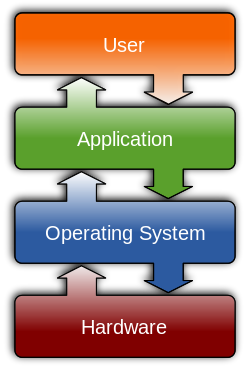Operating system: Difference between revisions
Mr. MacKenty (talk | contribs) No edit summary |
Mr. MacKenty (talk | contribs) No edit summary |
||
| Line 12: | Line 12: | ||
# CPU Scheduling | # CPU Scheduling | ||
# Devices, Device I/O | # Devices, Device I/O | ||
# Interrupts | # Interrupts | ||
# The user interface, most often a [[GUI]] but also a [[CLI]] | # The user interface, most often a [[GUI]] but also a [[CLI]] | ||
An operating system also provides: | |||
# Tools for managing the operating system | |||
== Different operating systems == | == Different operating systems == | ||
Revision as of 14:56, 1 September 2016
An operating system (OS) is system software that manages computer hardware and software resources and provides common services for computer programs. All computer programs, excluding firmware, require an operating system to function.[1]
An operating system manages:
- Memory
- Processes
- Boot-up / Shutdown process
- Files
- Security
- CPU Scheduling
- Devices, Device I/O
- Interrupts
- The user interface, most often a GUI but also a CLI
An operating system also provides:
- Tools for managing the operating system
Different operating systems[edit]
- Linux
- OS X
- WIndows
- iOS
- Android OS
- Google chrome OS (Based on Linux)
Do you understand this topic?[edit]
- Describe the main functions of an operating system.
Do you have an advanced understanding about this topic?[edit]
- Describe how an operating system manages the functions you have just described above.
